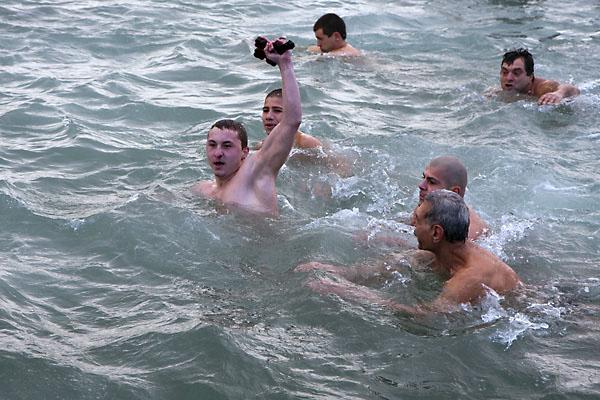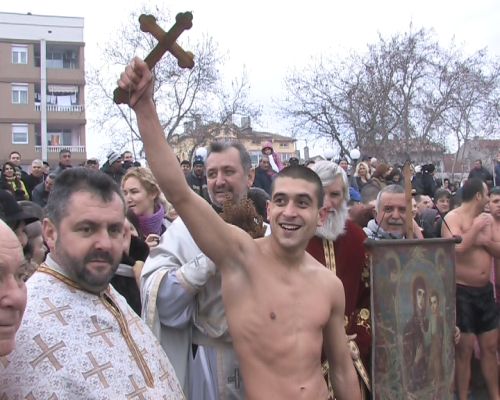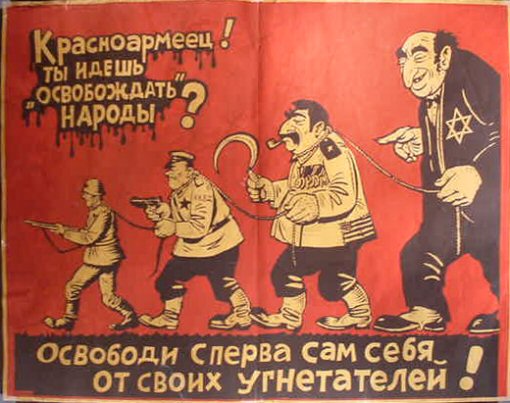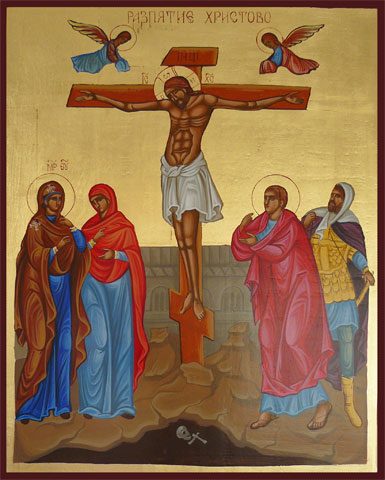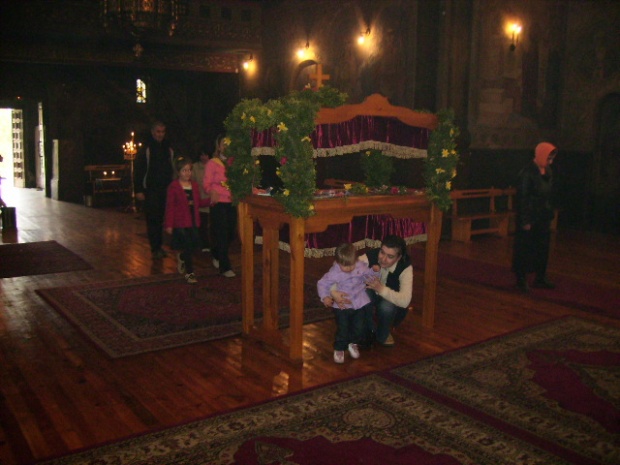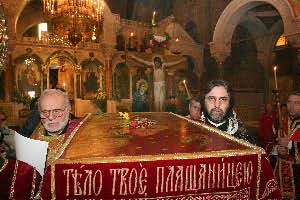![]()
These week passed the Second Sunday of Lent, for one more year prat of Church Lent Calendar. This Pre-Easter Great Lent holiday marks one of the spiritually important stops along the way and our participation in the Calvary sufferings of our Divine Master, and above all in His glorious Resurrection, that is repeated throughout the 40 days of Great Lent.
In the Western Church in the Roman Catholic Christiandome, Saint Gregory of Palama is little known as he is one of those typical Eastern Orthodox Saints that did not make fame in the West as the western christian, has departed from its ancient Christian teachings and put more importance on didactical thinking of the world (didactism) and scholastism and left away the importance of heart as part of the restoration of soul and unification with God in the completenes of work of attaining salvation and attendance of God's energy in the Eternal Soul, here and now throughout this temporary life. God's energies are not the same as God itself and Saint Gregory Palamas give a very in depth and complete hierarchical structure of different kind of energies that God used to built the world and the createres starting from creation of the Lights and Energies of the World, the Space, The Stars, Galaxies, The Sun, The Moon the Earth and the rest of the multitude of Pleiades that comtemporary astronomy knows to the tiniest plant and creater animal towards the crown of his creation the Man and Woman (Adam and Eve)..
The topic of teaching of Hesychasm is enormous and in this article, I'll be unable to give even a very brief of overview of it as Hesychasm. Hesychasm was a practice that perhaps started even in the Old Testament and practiced by the Ancient Prophets and continued first in the Holy Apostles, later by the Archibishops, Bishops, priest, deacons, monks, martyrs towards the last layman in the church.
In short it is rooted in the Simple repeation of The Lord's Prayer "Lord Jesus Christ Son of the Blessed God have Mercy on me the Sinner!", again and again combined with a very specific breathing in and breathing out. The first part of the Prayer "Lord Jesus Christ Son of the Blessed God" is said during breathing in while the second one "have mercy on me the sinner" is said during breathing out, the inhailed air within trachea. This is continued as practice by the Prayer practicioner all and on throughout day and night with the blessing of an Spiritual Elder or a practicioner who has received the prayer from his teacher and the practice is to be done, only with a blessing of a experienced spiritual elder (staretz) and not to be done on by own will. Usually the prayer is being transferred from Elder to a Apprentice pupil, just like the (Son / Daughter) Kid receives his DNA from the parent, thus practicing it without the proper blessing too much might be dangerous and lead the practicioner in a very dangerous realm of proudness for thinking one being more enlightened than the rest (more superior) more knowledable (or more proud – that is a deadly sin we fight against), throughout our whole life as christians.
Theosis is also a Topic that multitude of Books cannot describe as to be attained is a hard path through a combination of a practical knowledge about God and his laws and the Theoria (the intellectual attaindance of God's energies throgh prayer). The topic of Theosis is being exposed and discussed of tens of hundred thousand of various books and thus the simple path to attain it throgh constant repetition of Prayer by illuminating the Soul, instead of doing intellectual exercises as was thought in the west would be perhaps revolutionary for roman catholics and protestant western people.
But enought talk lets see shortly the biography of Saint Gregory Palamaes and why he is so important for Eastern Orthodox Christians, that the Church decided to have a special Sunday every year during the period of great Lent.
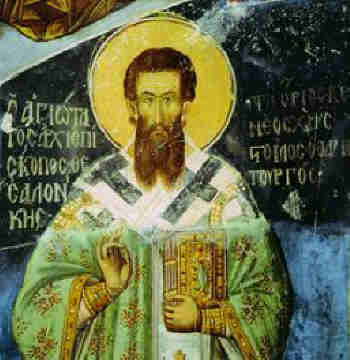
When did the saint Saint Greagory of Palames lived?
Saint Gregory lived in the 14th century. This is also the time of the teaching of hesychasm, which we mainly associate with the personality of Sаint Gregory, but the truth is the tradition of hesychasm was an ancient tradition practiced even by apostles and every christian since the time of Christ through the centuries, traditioan that was often neglected by many through the centuries, just to be retold and shown again in the early mid centuries in 14 century.
St. Gregory was born in 1296 in a family of refugees from Asia Minor. The surname Palama indicates a noble ancestry, since at that time ordinary people had only names and nicknames. Having completed his education in Constantinople, Gregory Palamas had the reputation of a brilliant connoisseur (well knowing the phylosophy) of Aristotle.
Around 1315, he and his brother became monks on Athos. On Mount Athos, Gregory lived in various monasteries, until he finally settled in the hermitage of Saint Sava, which was attached to the Great Lavra of Saint Athanasius of Athos. Living for most of his time in this hermitage, Gregory attended the Lavra to participate in the common services and sacraments.[1]
Short Movie about the Cave of Saint Gregory Palama in (Beroea) Veria in Russian
Gregory later became Archbishop of Thessalonica. He died in 1359, and his memory is celebrated two times in the year in the Church calendar (as many of the saints) on November 14, as well as on today's second Sunday of Great Lent, that in 2024 falls on 30th of March.
Saint Gregory Palamas defends the position that, although unknowable in His essence, God is knowable through His external appearances, energies.
God's energies are the grace poured out by God upon His creation. Although not God in His essence, the divine energies are not something created either, "they flow eternally from the one essence of the Holy Trinity.".
The times in which Saint Gregory lived were very unrestful, the Byzantine empire has been attacked and big parts of it already conquered by the Ottoman Turks and before he before he became archibishopship of Thessaloniki has been captured by the invading turks and has lived as a captive.
He went through many hardships, lived as a hermit and wanted to live a life in total seclusion and isolation of the world, just like the ancient hermit saints, a life of continuous prayer through which he wanted to help the world and reunite himself and the world through himself with God the creator of all things.
Opponents of Saint Gregory and his teaching of Theosis were the Calabrian monk Barlaam and Gregory Akindin. According to them, the divine essence exists, its created consequences also exist, but there are no divine actions. They accused St. Gregory of distorting religious truths. The fight against saint Gregory by those two monks with heretical partly pro-scholastic ideas were also perhaps related to the partial distancing of people from true Orthodoxy because of the Unia (religios union with the Roman Catholics) and acceptence of some heretical ideas that wre already taking part in the Roman Catholic Church after the Great Schism in year 1054 in which the Eastern Church distanced from the Western Church because of both dogmatical, historical and theological reasons and most importanly the false pretencies of the Pope to be the head of the whole Wordly Church as well as the inclusion of the heretical and unknown in the ancient Church "filioque", claiming the false and unknown dogma prior to 8th century that the Holy Spirit proceeds from both the Father and The Son, something that is not in the Niceo-Constantinople Creed of Faith, decided by the Holy Fathers in the Ecumenical Councils to be the official confession of the whole church about the Dogmatical definitions of faith.
![]()
Saint Gregory Palama
Saint Gregory's Triads
In response to Barlaam's attacks, Palamas wrote nine treatises entitled "Triads For The Defense of Those Who Practice Sacred Quietude". The treatises are called "triads" because they were organized as three sets of three treatises.
The Triads were written in three stages. The first triad was written in the second half of the 1330s AD and are based on personal discussions between Palamas and Barlaam although Barlaam is never mentioned by name.
Gregory's teaching was affirmed by the superiors and principal monks of Mount Athos, who met in synod during 1340–1. In early 1341, the monastic communities of Mount Athos wrote the Hagioritic Tome under the supervision and inspiration of Palamas. Although the tome does not mention Barlaam by name, the work clearly takes aim at Barlaam's views. The tome provides a systematic presentation of Palamas' teaching and became the fundamental textbook for Byzantine mysticism.
In response, Barlaam drafted "Against the Messalians", which attacked Gregory by name for the first time. Barlaam derisively called the hesychasts omphalopsychoi (men with their souls in their navels) and accused them of the heresy of Messalianism, also known as Bogomilism in the East. According to Meyendorff, Barlaam viewed "any claim of real and conscious experience of God as Messalianism".
![]()
Saint Thedosious of Tarnovo a Bulgarian saint one of the Pupils of Saint Gregory Palama and one of the main Hesychasm teacher and disperser of ancient Christian Tradition of Hesychasm within Bulgaria,
Many of his Pupils later spread the Tradition to the rest of Orhodox Newer Local Churches
Barlaam also took exception to the doctrine held by the hesychasts as to the uncreated nature of the light, the experience of which was said to be the goal of hesychast practice, regarding it as heretical and blasphemous. It was maintained by the hesychasts to be of divine origin and to be identical to the light which had been manifested to Jesus' disciples on Mount Tabor at the Transfiguration. Barlaam viewed this doctrine of "uncreated light" to be polytheistic because as it postulated two eternal substances, a visible and an invisible God. Barlaam accuses the use of the Jesus Prayer as being a practice of Bogomilism (a heretical movement that was plaguing the Church of 14th century and who has been publicly refused in Local Church council in Medieval Bulgaria organized by the Bulgarian Patriarch of that time was Theodosious, a council who was requested by the insistance Saint Theodosius of Tarnovo", due to the many heretical teachings plaguing the Bulgarian Church of that time)
The second triad quotes some of Barlaam's writings directly. In response to this second triad, Barlaam composed the treatise "Against the Messalians" linking the hesychasts to the Messalians and thereby accusing them of heresy.
In the third Triad, Palamas refuted Barlaam's charge of Messalianism by demonstrating that the hesychasts did not share the antisacramentalism of the Messalians nor did they claim to physically see the essence of God with their eyes. According to Fr. John Meyendorff "Gregory Palamas orients his entire polemic against Barlaam the Calabrian on the issue of the Hellenic wisdom which he considers to be the main source of Barlaam's errors."
As we have said, we associate the personality of St. Gregory with the teachings of Hesychasm. Hesychasm is based on man's ability to attain godlikeness (theosis).
"Worship is supernatural participation in the essential energy of God and union with Him" [3]. This assimilation to God is achieved through the incessant silent prayer (Greek's word hesychia) of the practitioner of hesychasm and the gift of divine grace, in which "man becomes all that God is, except for the essence".
To achieve hesychia, hermit-monks constantly practiced the so-called Jesus prayer ("Lord Jesus Christ, have mercy on me, a sinner!"). According to many fathers, this prayer contains the whole gospel in an abbreviated form. We must note that even today the Jesus Prayer is important in the lives of both monks and lay people. Pay attention to the fact that sometimes its use must be done with spiritual-pastoral guidance.
The vision of the Taborian light of grace, which the apostles saw at the time of the Transfiguration of their Master, is a key moment in the whole teaching of hesychasm. Most of the Fathers who speak of the Transfiguration, such as Saint Basil the Great, Saint Gregory of Nazianzus, Saint John Chrysostom, etc., assert that the nature of the light which the apostles saw on the mountain was divine and uncreated. This is exactly what Saint Gregory Palamas defended in the 14th century. This is also the proof that his teaching was not new, but the ancient teaching of the Church.
According to St. Gregory, the Light of Tabor is divine. Through it, man communicates with God, who gives him His grace. We know that the grace of God is given most fully in the sacraments of the Church. And above all, in the Holy Eucharist – communion with the body and blood of our Savior. As noted by Professor Georgi Kapriev: "Palama explains that not just nature or just the soul, but the entire hypostasis of the faithful partakes of the worshiping bread and chalice"[5].
In the end, the side of the hesychasmists wins. A council of 1341 condemned Barlaam, but nevertheless some Byzantine theologians continued to protest against Palamas' positions. However, his theology received final conciliar approval successively in 1347 and 1351, as well as posthumously in 1368, when he was canonized as a saint.[6]
In the 14th century, hesychasm was widespread not only among hermits, but also among monks from communal monasteries, and even among many lay people. It is becoming a strong international movement. From Athos, hesychasm spread to Byzantium, and from there to Bulgaria. From Bulgaria, through the so-called "second South Slavic influence", the hesychastic teaching reached Serbia, Wallachia-Moldavia and Russia.[7]
Hesychasm has an influence on the entire "worldview" of the Christian East and its artifacts. This is the time of the so-called Palaeologous Renaissance, which got its name from the ruling dynasty at the time and had its achievements in literature, visual arts and music.
Today, we Christian believers of the 21st century live in a time separated from the life and work of St. Gregory Palamas by more than six centuries. However, our respect for him and his teachings is actually a testimony to our devotion to the teachings of holy Orthodoxy.
The truths that St. Gregory expressed and maintained are valid even now. Many Monks still follow the teachings of Hesychasm and try to constantly repeat in their mind the Lord Prayer "Lord Jesus Christ Son of the Blessed God, Have Mercy on me the Sinner".
The Life of Saint Gregory Palamas and his Teaching on Hesychasm and Theosis
Today we also need the grace of God, our Creator. Without it, we would become barren trees that would be of no use (cf. Luke 3:9).
Let us more often proceed to prayer and observance of the evangelical commandments for active love for our neighbor. May our communion in the Church of Christ by means of the holy sacraments not cease.
And above all, let us proceed to the holy Eucharist, which is given to us by God "for the good and sanctification of our souls and bodies"[8].
Sources
https://dveri.bg
(Article Source Text in Bulgarian by Priest Ivaylo Borisov)
[1] Cf. Meyendorff, John. Introduction to patristic theology (lecture course for seminaries).
[2] Loski, V. An Essay on the Mystical Theology of the Eastern Church., S., 2005, p. 71.
[3] Kapriev, Greek Byzantine philosophy. Four centers of synthesis. S., 2001, p. 289.
[4] Ibid.
[5] Ibid., p. 294.
[6] Cf. Mayendorf, J. Byzantine Theology. S., 1996, p. 102.
[7] Cf. Kuyumdzhieva, S. Old Bulgarian music. S., 2011, pp. 90-91.
[8] From the first thanksgiving prayer after Holy Communion.
